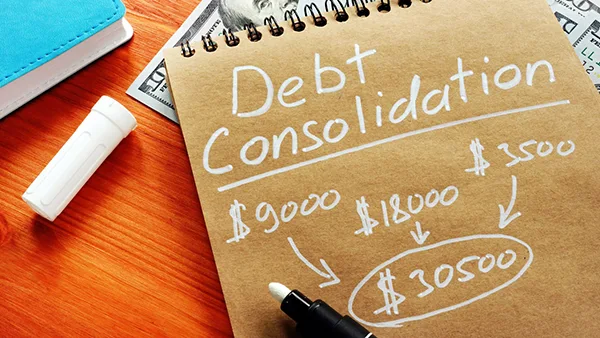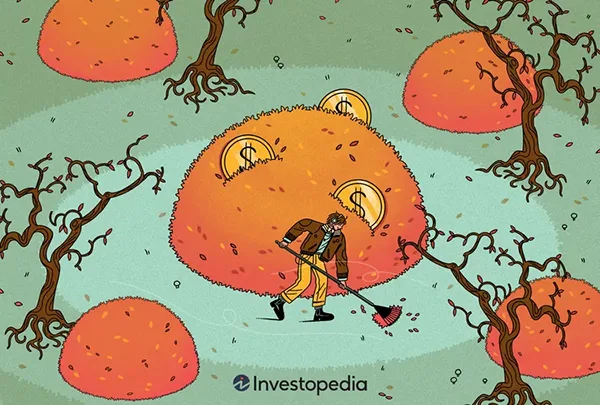Key Takeaways
- Debt consolidation is the act of taking out a single loan or credit card to pay off multiple debts.
- The benefits of debt consolidation include a potentially lower interest rate and lower monthly payments.
- You can consolidate your debts using a personal loan, home equity loan, or balance-transfer credit card.
- Many balance transfer credit cards are available that offer 0% interest rate on your balance for a fixed time.

You must have heard that “Debt is the Slavery of a Free Man”, and this is true. Not everyone is capable of fulfilling their requirement at every stage of life. This is where ‘Loan’ takes entry and helps the person to gain stability.
Nothing is strange or uncommon about taking a loan in some stages of life, such as a medical emergency, a costly home repair, or an important event like a wedding. And repaying those monthly debts of different amounts on various due dates can easily make you financially overwhelmed. For such situations, a loan can help you convert your debt into manageable payments and structure your high-interest debts.
Continue reading to learn how debt consolidation works, how to tackle your debt with loan management strategies, and some potential downsides. Analyzing such information can provide you with clarity on whether such a load is a needed step to free up your money and help you out in making the most of your life in Laredo, TX.
Understanding the working of debt consolidation is important before you apply for any such loan. At its core, debt consolidation helps you to bundle your debts. Most often, a debt consolidation loan is used to consolidate higher-interest debt, generally medical debt or credit card debt.
You can roll old debts into new debts in several ways, such as by taking out a new personal loan, by taking a home equity loan, or by taking a credit card with a high credit limit. Then you can repay debts by using the funds from the loan. If you want to consolidate old credit cards, then you can use a new credit card and transfer the balances of your old cards to the new one. Even many balance transfer credit cards are available that offer 0% interest rate on your balance for a fixed time.
Many financial institutions offer personal loans for consolidating debt, including banks, online lenders, and credit unions. Personal loans are secured or unsecured. In a secured loan, you have to give some valuable thing as collateral, such as jewellery and a car. This collateral will be taken by the lender if you are unable to repay the loan. If you are not fit for a secured loan, then you can look for an unsecured loan that won’t require anything to be submitted as collateral.
Many lenders are available that can provide you with a loan within 24 hours of the request. They may ask for some kind of fees for their fast services. It is advised to do your research and find a lender that will provide you with a loans in Laredo, TX, and suits you the best.

Debt consolidation can help you streamline your finances and consolidate your debt in many ways.
Debt consolidation helps you simplify your financial life by combining your unsecured debts into a single manageable monthly payment, which means that credit card, medical, and other unsecured debts will be converted to a single payment.
You will know how much you actually owe on the loan every month and for how long. The end payment will be much lower than your previous combined payments, giving you relief from financial burdens.
As you will make a consolidated payment, your funds will be distributed to the creditors. You will be paying off your debts more quickly with the help of a debt consolidation loan, which will be because of the fixed interest rates and the repayment schedules.Use https://energysavings.com/ to save money on your energy costs while you work to offset other debt.
Surprising Fact
You can also hire a debt consolidation company to assist you. However, they often charge hefty initial and monthly fees. It’s usually easier and cheaper to consolidate debt on your own with a personal loan from a bank or a low-interest credit card.
The interest rate of a personal loan is typically lower than that of credit card accounts, although you will end up saving money on the overall interest.
It is better to consider some points before you apply for any loan and decide if debt consolidation is good for you or not.
Whether you will be approved for the personal loan depends mainly on your financial profile. According to which your credit score will be considered, that directly reflects your financial profile. Your credit score is a three-digit number that shows how efficiently you have managed your credit in the past.
Many lenders use scores from the FICO(Fair Isaac Corporation) scoring model, which ranges from 300 to 850. For general understanding:
Several versions are available for FICO scores. Lenders choose the appropriate score version based on the type of loan that you are applying for.
Aside from the credit score, to know the probability of your loan repayment, lenders also check your credit history, income, and debt-to-income ratio. Altogether, combining these factors helps to determine whether you are eligible for the loan, and what interest rate and repayment terms should be offered to you.
Consolidating your credit card debt is a good way to save money. This applies as long as you are not tempted to run up those balances again once the cards are paid off. If you do this, then this could result in a worse situation than before you consolidated your debts.
If you are likely to overspend, then you may reduce the risk. This risk is of using your cards again by removing them from your wallet or any other online site where you store your card number. It is better to close your account than reduce its access to your cards, as this can have a negative effect on your credit scores.
Before applying for a loan, take your time to understand how it works and how you will manage your finances. If you are overspending, can’t stick to a budget, and aren’t saving, then this is the right time to rethink your approach to money.
Managing financial stress that comes from managing multiple debt payments every month can be helped by securing a personal loan. The key is to understand debt consolidation, its benefits, and all of its downsides to find out whether this kind of loan is best suited for you.
Debt consolidation is a form of debt refinancing that entails taking out one loan to pay off many others. This commonly refers to a personal finance process of individuals addressing high consumer debt. It can also refer to a country’s fiscal approach to consolidate corporate debt or government debt.
Many lenders are available that can provide you with a loan within 24 hours of the request. They may ask for some kind of fees for their fast services. It is advised to do your research and find a lender that will provide you with a loans in Laredo, TX, and suits you the best.
To become eligible for a personal loan, you have to maintain your financial profile and your credit score. A credit score is a three-digit number that reflects how you have managed your credit in the past.
For such a case, debt consolidation can be taken, which will provide financial stability as it will combine multiple loans with a fixed monthly payment.
